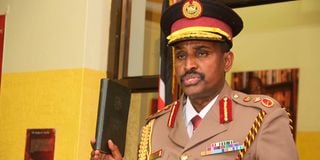Disbandment of police units began way back in the early 1980s

Acting Inspector General of Police IG Noor Gabow. Mr Gabow said that in his speech during the Mashujaa Day ceremony at Uhuru Gardens in Nairobi, President William Ruto highlighted issues of concern on how the service impacts the public.
What you need to know:
- Every new head of the CID – now DCI – since the tenure of Noah arap Too in 1984 has established special crime-fighting units to implement their agenda policies.
- When Francis Sang became the CID director in 1999, he launched the Special Crime Prevention Unit (SCPU) headed by Senior Superintendent of Police Peter Kavila.
- Mr Kinoti, who upon being made DCI boss, disbanded the Flying Squad and established the SSU.
Special crime-fighting units in the Kenya Police Service have since the early 1980s had a history of being disbanded, reconstituted or downgraded.
Every new head of the Criminal Investigations Department (CID) – now Directorate of Criminal Investigations (DCI) – since the tenure of Noah arap Too in 1984 has established special crime-fighting units to implement their agenda policies.
Acting Inspector-General of Police Noor Gabow (right) on Friday said redeployment in the DCI is normal even as news emerged that members of the Special Service Unit (SSU), which replaced the Flying Squad following its disbandment by then-DCI boss George Kinoti had been ordered to report to the Internal Affairs Unit (IAU) over accusations of extra-judicial killings.
“This is a normal reorganisation of policing. Key issues raised revolve around police complicity in criminality, especially extra-judicial killings. Whereas the majority of our officers are law-abiding and offer an exemplary service, a few rogue officers operate outside the Constitution and legal framework, hence tarnishing our name,” Mr Gabow said.
“I echo the sentiments of the President and take this opportunity to remind officers of their high calling, which should be exercised in strict accordance with the Constitution and the rule of law.”
When Francis Sang became the CID director in 1999, he launched the Special Crime Prevention Unit (SCPU) headed by Senior Superintendent of Police Peter Kavila.
Motor vehicle theft
The unit and the Flying Squad were to fight motor vehicle theft.
Special operations were conducted by the SCPU, which consisted of a team of sharpshooters from the General Service Unit (GSU).
While the Pangani and Makuyu-based Flying Squad officers were credited with hunting down individuals and groups implicated in bank robbers and carjackings, some were accused of working with the same criminals.
In one case, a member of the Flying Squad, who reported directly to the CID boss, responded to a report of a carjacking in Buru Buru, Nairobi, and ordered his colleagues who happened to be nearby to keep off as he was in pursuit of the criminals.
In the ensuing confusion, the officer was shot and badly injured by his colleagues in a “friendly fire”. The carjackers escaped.
Two dreaded Flying Squad officers, including “legendary” Timothy Kamunde aka Mzee, were interdicted and ordered to surrender their guns.
The next CID boss after Sang was Daniel Ndung’u, who only served from 2003 to 2004. There were no major changes during his term.
When Joseph Kamau took over in 2004, he maintained the SCPU and Flying Squad.
He also set up the Kanga Squad under his personal assistant George Kinoti.
This team cracked some cases, including the robbery at the Norfolk apartments of Prof Ngugi wa Thiong’o and his wife.
The next CID chief, Simon Karanja Gatiba, disbanded the Kanga Squad following a public outcry after the Artur brothers – Margaryan and Sagasyan – were implicated in the Standard newspaper offices raid on Likoni Road and several other incidents.
Like Ndung’u, Gatiba’s 2006-2010 tenure was not controversial.
When Ndegwa Muhoro was appointed by the National Police Service Commission to head the DCI in 2010 following the promulgation of the Constitution, he preferred to work closely with the heads of the Criminal Investigations Unit, Anti-Terrorism Police Unit, Land Fraud Unit and Criminal Registry Office for the eight years he served.
SSU formed
Then came Mr Kinoti, who upon being made DCI boss, disbanded the Flying Squad and established the SSU.
Flying Squad officers had gone rogue, according to many right organisations, and were working with criminals.
The SSU was tasked with critical operations that had earlier been mandated to the Flying Squad.
Mr Kinoti reconstituted his Kanga Squad team. It was based at DCI Parklands but reported directly to his office.
The unit was instrumental in operations by the umbrella Multi-Agency Team (MAT) that cracked down on counterfeit goods, especially the controversial mercury-contaminated sugar, cooking oil, contraband rice and car tyres.
The MAT was composed of Kenya Revenue Authority, Directorate of Public Prosecutions and Kenya Bureau of Standards officers.
Mr Gabow said the Kenya Police Service’s foremost purpose is to protect lives.
“Officers should be governed by the laws of Kenya and the Service Standing Orders and should be reminded of their role as servants of the people,” he said in the statement to the Deputy Inspectors General of Kenya Police Service, Administration Police Service, the DCI and IAU.
The Acting Inspector-General of Police directed the new DCI director to finalise pending cases of reported missing persons and the director of IAU to finalise matters under investigations where police complicity in crime is the subject.
Mr Gabow said that in his speech during the Mashujaa Day ceremony at Uhuru Gardens in Nairobi, President William Ruto highlighted issues of concern on how the service impacts the public.





